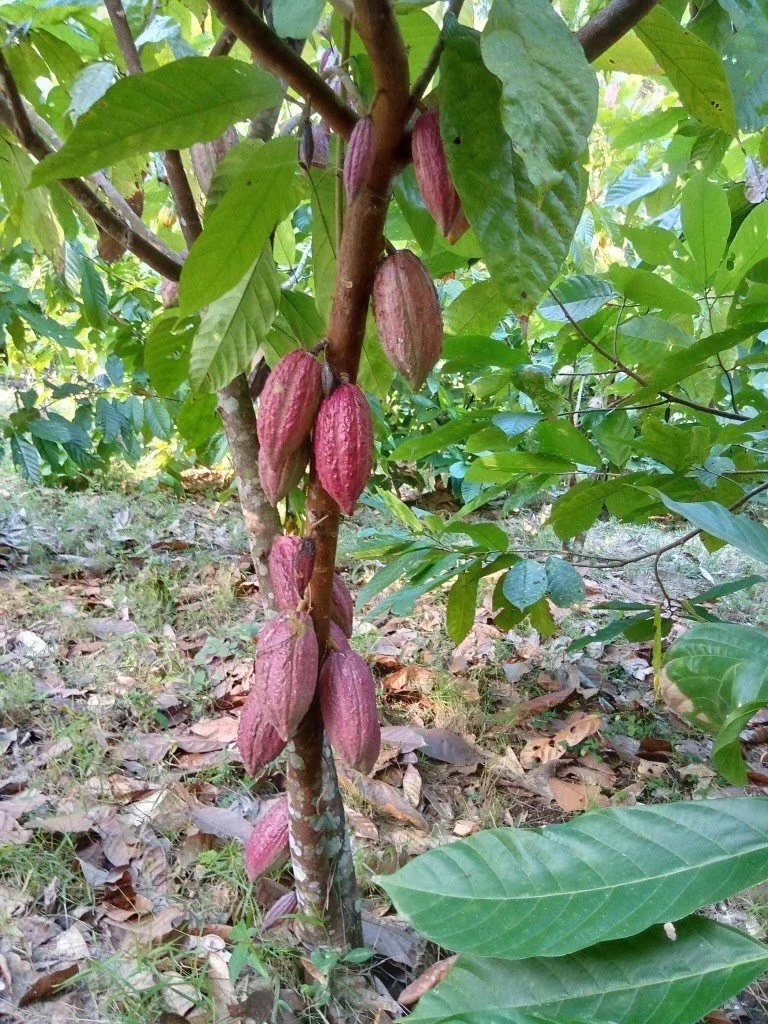Hope, Resilience, and Cacao: Kemu Farms in Liberia
Otis Kemutambah’s parents operated a cacao farm in Liberia when he was young. In 2019, he started his own—Kemu Farms—in this coastal west African country bordered by Guinea, Côte d’Ivoire, and Sierra Leone. The intervening decades were a winding road for Otis that saw him survive a war and a refugee camp, cross an ocean, start a family, and finally revisit his homeland to plant new seeds of hope. To understand that journey, we have to understand more about the country’s rich but troubled history.
“Liberia means liberty,” explains Otis. We first met at the Midwest Craft Chocolate Festival in Rushville, Indiana, in November 2024, and I spoke with him and his daughter, Jutta, again over Zoom from their Detroit home. “After the abolition of slavery [in the U.S.], a group of Black people were pushing to go back to Liberia. A lot went home in the mid-1800s. Liberia was not a colonized country. Liberia was the first independent African nation because of that movement.”
While there was good that came from this, there were also negative consequences. Otis explains that the Black migrants who returned to their homeland had been Western-educated, and often had condescending views of indigenous Liberians, leading to a societal apartheid similar to South Africa’s. By the 1980s, tensions within this divided society had reached a boiling point. A violent coup took place that set off a civil war lasting from 1989 to 1996 (a second civil war lasted from 1999 to 2003). About 250,000 Liberians lost their lives, and many of who survived were displaced
Otis ultimately had to leave Liberia and live in the Buduburam refugee camp in Ghana, which was established in 1990 by the United Nations. The camp became home to tens of thousands of Liberians, and while it protected them from the violence of the war, conditions weren’t easy. Nevertheless, a lot of good came into Otis’s life during this time; he met and married his wife, Elvira, and completed his college degree through a UN scholarship program. In 1997, he and Elvira were granted Visas to immigrate to the United States, and found a home in Detroit, Michigan.
Otis and Elvira Kemutambah with farm workers on their farm in Liberia. Photo courtesy of Kemu Farms.
The pair had four children—their daughter, Jutta, is the assistant CEO of Kemu Farms—and Otis worked a variety of jobs to support the young family. He’s been an insurance agent, worked in adult foster care—he even drove an ice cream truck for a while—before eventually landing in nursing, a career from which he’s preparing to retire to devote his attention to his new passion. He’s building something new in Liberia, honoring his family’s legacy and providing jobs and hope for a new generation.
Otis explains that while cacao grows very well in Liberia, there hasn’t been much incentive to farm the crop until recently. Firestone Tires has operated a major plant in Liberia since 1926, and the company’s rubber tree plantation there is the largest in the world.
“With the price of rubber falling, people are now more interested in commodity produce,” says Otis. “It’s not just cacao, but coffee as well. Right now the current president is really pushing going back to the farm and developing the land.”
The Kemu Farms plot is comprised of 230 acres, and Otis is hoping to purchase 140 more. In addition to growing cacao, Otis wants the farm to operate as a processing center for other small cacao farms in the area as well. He’s exploring the possibility of installing a solar dryer for drying in a greenhouse, keeping the drying beans from contamination from insects or other debris.
“There are a lot of NGOs in the country that are working with local farms and teaching them processes that will make the cocoa from Liberia world-class,” he says.
Images above courtesy of Kemu Farms.
While over 20 years have passed since the end of the second civil war, Otis says the country is still reeling from the effects of the conflict, and he wants Kemu Farms to be part of the recovery process.
“The country is devastated. We are building up from it, but there are still a lot of challenges,” he explains. “Where we are operating, we are the main source of livelihood for people. Each time I go there I’m looking at that condition and getting to know their stories. They see us as having hope for them and their children. I remember last year when I was there, one of the employees came up to me and said, ‘Oh, thank you. It’s because of this job I’m able to send my son to school.’ It means a lot to me to be carrying on the family tradition.”
Days after we spoke in February 2025, Otis left on an extended trip to Liberia to evaluate the farm and continue the hard work of making the business operational and sustainable. He hopes to begin selling cacao in 2026, and is still evaluating options for selling to small craft makers directly, working with intermediary brokers, and selling in bulk to larger companies. He hopes to put Liberia on the map for great cacao.
“We’re really trying to carry this legacy through,” says Jutta. “Hopefully this is something that we can pass down from generation to generation.”
Editor’s note: Kemu Farms does not yet have a website or social media presence, but I will be updating information here and on our other platforms as it becomes available.



